Current auto skill sets under pressure by '22
Abundant and low cost labour will continue to make India an attractive manufacturing hub at least for the next 2-3 years but the upcoming disruptions in manufacturing call for new skill sets.
The challenge of skills is looming large on the Indian automotive sector. While captains of industry and apex associations SIAM and ACMA are already seized of the enormity of the challenge, a new survey reiterates the concern. The automotive sector currently employs about 19 million people both directly and indirectly.
As per the ‘Future of Jobs in India: A 2022 perspective’ report, launched on December 27 by EY and commissioned by FICCI and NASSCOM, by the year 2022, 50 to 55 percent of Indian workforce in the automotive sector would be deployed in jobs that have radically changed skill sets.

Reskilling rated as one of the topmost initiatives by 80 percent of the industry players.
The survey undertook extensive primary and secondary research and analysis. During the primary research, EY interacted with more than 130 business leaders, academicians and representatives of industry associations across sectors (IT-BPM, automotive, retail, textiles and apparel, BFSI) in India.
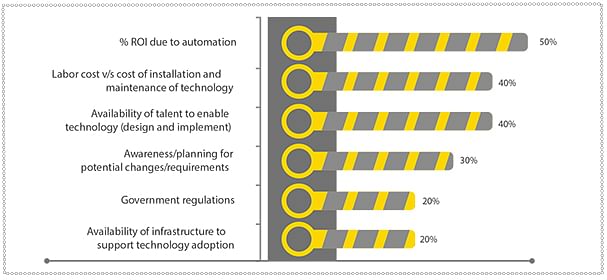
Although the auto sector has been a quick adopter of newer technologies, barriers remain.
According to the report, more than 75 percent of industry experts believe that the rising middle-class and creation of highly optimised supply chains are the two primary megatrends impacting the sector. The country would continue to be an attractive hub for manufacturing due to the availability of abundant low-cost labour for at least two years. Along with the rising middle-class which currently accounts for low auto ownership (18 cars per 1,000 citizens) will drive the demand for the domestic automotive industry.
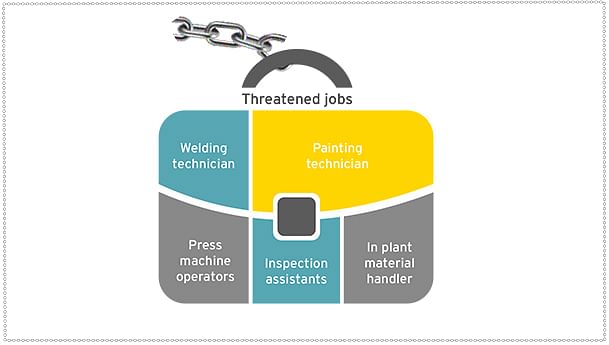
Some of the jobs which will turn obsolete in the future
Robotics and automation see high interest
The survey findings provide insights into the future of jobs and vision of change for the job market in India by 2022, highlighting the impact of various primary forces such as globalisation, demographics, and Industry 4.0/exponential technologies, which are expected to have on the key sectors of the economy.
Of the surveyed industry executives, 70 percent recognised the strategic importance of smart connected products for the industry and 55 percent stated big data, cloud computing as one of the key technology drivers in the automotive industry. Robotics and automation is seen as one of the most impactful technologies for the Indian automotive industry by 50 percent of the respondents.
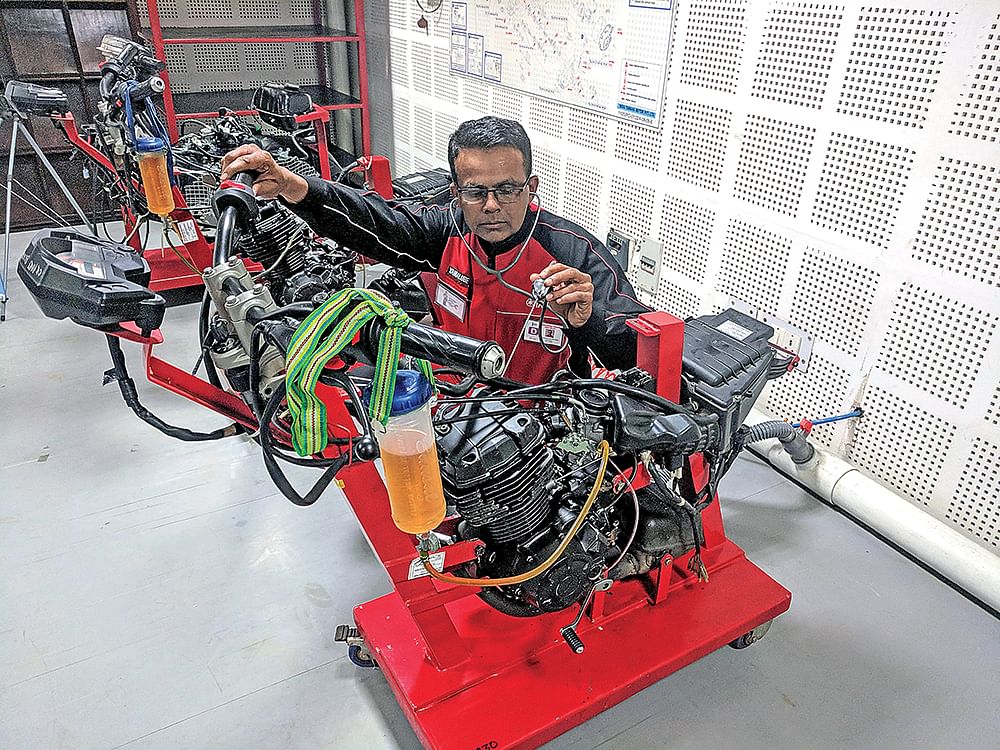
It further found that increasing automation through robotics that is being adopted the roles of the repetitive job such as painting and welding are being threatened. On the other hand, opportunities in robotics programming and maintenance will increase.
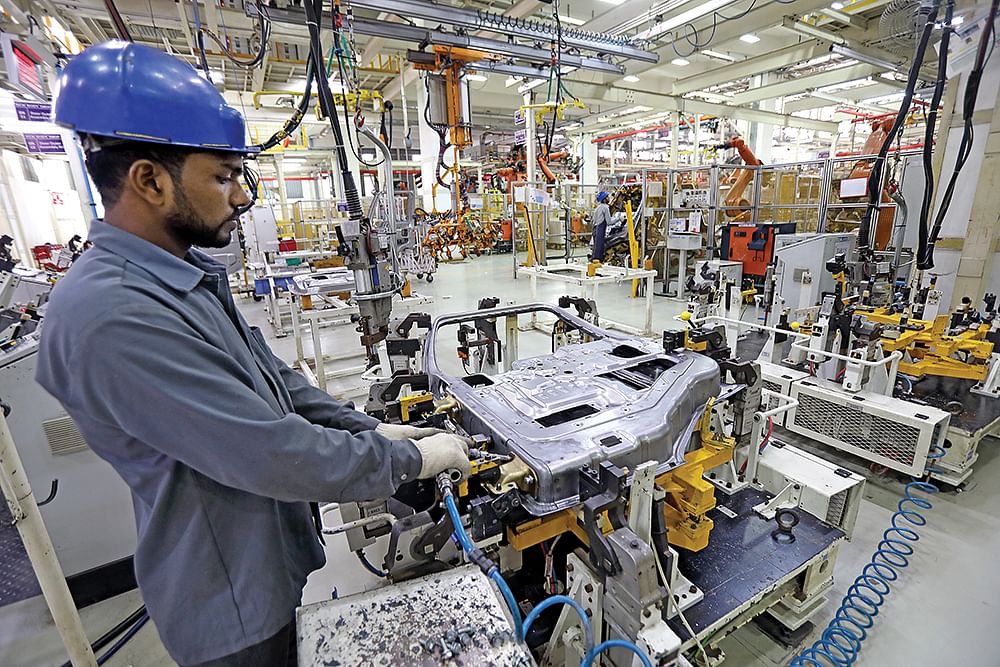
Welding shops are expected to be fully automated by 2020.
The Indian automotive company’s survey attests to the deployment of robots on the shop floor, making its way through die-casting and welding. Robots have enabled almost 70 percent to 100 percent automation in weld shops, press shops, cast shops and paint shops. It further expects that paint and welding shops to be completely automated by 2020, while the use of robots in the assembly line is limited to 20 percent across companies.
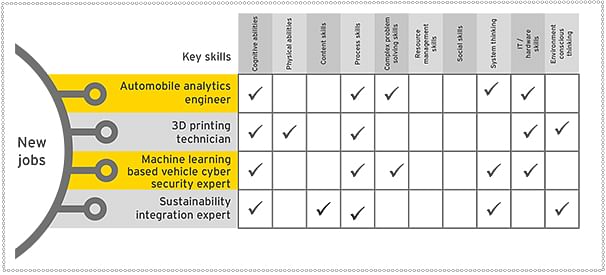
With connected cars, big data and cloud computing, industry will call for new skill sets.
The report states that with robots further penetrating into assembly operations to enable a higher degree of automation and lower costs for manufacturers, 50 percent of the respondents described robotics/automation to be one of the most impactful technologies for the Indian auto industry. The companies are also exploring the deployment of robots in the logistics function.
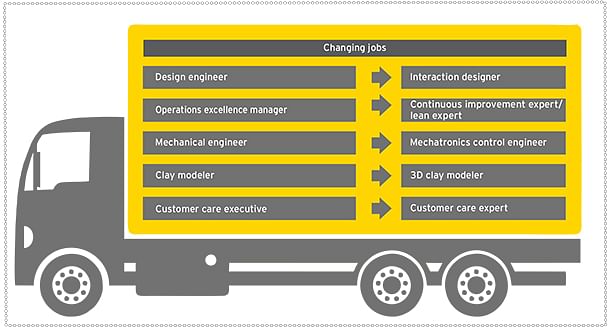
As the industry goes hybrid and electric, the workforce will have to upskill to ensure sustainability.
The advancements in IoT, big data and cloud computing are the building blocks to offering embedded smart, connected cars with functionalities such as advanced navigation, predictive maintenance, vehicle-centric services, remote monitoring of car features, external mobile experiences and over-the-air updates. Thus, the convergence of low-cost sustainable technologies, smart design and integration, innovative business models, and supportive policies for sustainable mobility services will have the potential to dramatically transform the automotive industry. This emergence of new-generation technologies is demanding a new set of skills from the auto workforce.
According to Anurag Malik, partner - People and Organisation Advisory Services, EY, “The Indian automotive industry is likely to witness an increased demand for skilled labour in the coming years, as the economic environment improves and investments are made as part of the ‘Make in India’ initiative. Now, with the advent of new- generation technologies, the industry needs to quickly come together and create collaborative learning ecosystems and develop workforce re-training programs across organisation levels to be future ready for the new job roles.”
Key Findings
- The automotive sector would continue to hire at a rate of 2 percent to 2.5 percent YoY against a historical growth rate of 3 percent to 3.5 percent to reach 14.3 million in 2022. Sixty percent to 65 percent of the jobs in 2022 would require new skill sets.
- India’s automotive industry saw an increase in automation, while plant-level automation at most OEMs remains at 30 percent; its level in the body shop is beyond 95 percent.
- Out of the surveyed industry executives, 70 percent recognise the strategic importance of smart connected products.
- With the introduction of connected cars, big data, and cloud computing, new skill sets will be required in design, operation as well as other elements of the auto value chain in the next five years.
- Some of the potential new job roles in the automotive sector include automobile analytics engineers, 3D printing technicians, machine learning-based vehicle cyber security experts and sustainability integration experts.
(All data and Infographics are based from NASSCOM, EY Study and FICCI)
(This article was originally featured in the 1 January, 2018 issue of Autocar Professional)
RELATED ARTICLES
RSB Group Prepares for Hyper-Growth: New Markets, Tech and Mission ₹10,000 Cr
From a small workshop in Jamshedpur to an engineering group with global reach, RSB Transmissions is preparing for its mo...
Beyond Helmets: NeoKavach Wants to Make Rider Airbags India’s Next Safety Habit
As premium motorcycles proliferate and riding culture evolves, an Indo-French venture is betting that wearable airbags, ...
Inside Mahindra Last Mile Mobility’s Rs 500 Crore Modular Platform Strategy
Mahindra Last Mile Mobility has launched the UDO, an electric three-wheeler built on a new Rs 500-crore modular platform...






 By Autocar Professional Bureau
By Autocar Professional Bureau
 29 Mar 2018
29 Mar 2018
 12622 Views
12622 Views





 Darshan Nakhwa
Darshan Nakhwa



 Shahkar Abidi
Shahkar Abidi

